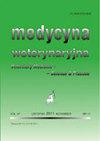河北省肉牛隐孢子虫和比氏肠细胞虫的流行病学
IF 0.4
4区 农林科学
Q4 VETERINARY SCIENCES
Medycyna Weterynaryjna-Veterinary Medicine-Science and Practice
Pub Date : 2023-01-01
DOI:10.21521/mw.6748
引用次数: 0
摘要
隐孢子虫和bieneusenterocytozoon bieneusi (E. bieneusi)是两种常见的条件致病菌,可以感染世界各地的人类和动物。位于渤海地区的中国河北省关于这些病原体流行情况的现有数据不足。采用针对隐孢子虫小亚基(SSU) rRNA基因和内转录间隔段(ITS)的巢式PCR方法,对河北省8个养殖场的718份本地肉牛粪便标本进行了隐孢子虫和布氏伊布氏绦虫的检测。隐孢子虫患病率为9.2%(66/718),比氏伊氏绦虫患病率为8.6%(62/718)。本研究共鉴定出andersoni C. (n = 56)和parvum C. (n = 10),阳性标本均为gp60基因IIdA20G1。ITS序列分析得到7种已知的比氏鄂氏杆菌基因型,分别为J (n = 48)、BEB4 (n = 4)、CHC8 (n = 3)、EbpC (n = 2)、I (n = 2)、D (n = 2)和BEB6 (n = 1),其中基因型D和EbpC属于人畜共患病1组,基因型2属于宿主适应型2组。这是河北省首次报道在肉牛中发生的比氏埃希氏菌。在本研究中,人畜共患病的细小梭状芽胞杆菌和两种布氏埃希氏杆菌基因型的存在表明,牛可能是人类或动物感染的潜在人畜共患病源。本文章由计算机程序翻译,如有差异,请以英文原文为准。
Prevalence of Cryptosporidium spp. and Enterocytozoon bieneusi in beef cattle in the Hebei Province of China
Cryptosporidium spp. and Enterocytozoon bieneusi (E. bieneusi) are two common opportunistic pathogens that can infect humans and animals worldwide. The available data on the prevalence of these pathogens is insufficient in Hebei Province, China, which is located in the Bohai Sea region. In the present study, 718 fecal specimens of native beef cattle from eight farms in Hebei Province were examined for the presence of Cryptosporidium spp. and E. bieneusi using nested PCR targeting the small subunit (SSU) rRNA gene of Cryptosporidium spp. and the internal transcribed spacer (ITS) of E. bieneusi. The prevalence of Cryptosporidium spp. was 9.2% (66/718) and E. bieneusi was 8.6% (62/718). C. andersoni (n = 56) and C. parvum (n = 10) were identified in this study, and all C. parvum-positive specimens belonged to IIdA20G1 in the gp60 gene. The ITS sequence analysis obtained seven known E. bieneusi genotypes, including J (n = 48), BEB4 (n = 4), CHC8 (n = 3), EbpC (n = 2), I (n = 2), D (n = 2), and BEB6 (n = 1). Genotype D and EbpC belonged to the zoonotic Group 1, while the other genotype belonged to the host-adapted Group 2. This is the first report on the occurrence of E. bieneusi in beef cattle in Hebei Province. In this study, the presence of zoonotic C. parvum and two E. bieneusi genotypes suggest that cattle can be a potential zoonotic source for human or animal infection.
求助全文
通过发布文献求助,成功后即可免费获取论文全文。
去求助
来源期刊

Medycyna Weterynaryjna-Veterinary Medicine-Science and Practice
VETERINARY SCIENCES-
CiteScore
0.80
自引率
0.00%
发文量
73
审稿时长
4-8 weeks
期刊介绍:
"Medycyna Weterynaryjna" publishes various types of articles which are grouped in the following editorial categories: reviews, original studies, scientific and professional problems, the history of veterinary medicine, posthumous memoirs, as well as chronicles that briefly relate scientific advances and developments in the veterinary profession and medicine. The most important are the first two categories, which are published with short summaries in English. Moreover, from 2001 the editors of "Medycyna Weterynaryjna", bearing in mind market demands, has also started publishing entire works in English. Since 2008 the periodical has appeared in an electronic version. The following are available in this version: summaries of studies published from 1999 to 2005, full versions of all the studies published in the years 2006-2011 (in pdf files), and full versions of the English studies published in the current year (pdf). Only summaries of the remaining studies from the current year are available. In accordance with the principles accepted by the editors, the full versions of these texts will not be made available until next year.
All articles are evaluated twice by leading Polish scientists and professionals before they are considered for publication. For years now "Medycyna Weterynaryjna" has maintained a high standard thanks to this system. The review articles are actually succinct monographs dealing with specific scientific and professional problems that are based on the most recent findings. Original works have a particular value, since they present research carried out in Polish and international scientific centers.
 求助内容:
求助内容: 应助结果提醒方式:
应助结果提醒方式:


